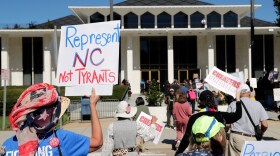Throughout the state, legislative incumbents are facing familiar challengers.
In 13 North Carolina legislative races this year, the incumbent faces the exact same challenger as two years ago. In some of these rematches, the margin of victory last election was close, and the loser will need to flip only a few hundred votes to come out on top in 2016.
In other cases, however, the winner cruised with a healthy margin of victory, suggesting a tough road for the challenger.
That hasn’t seemed to dissuade them.
"Eight thousand really isn’t that many votes when you look at the whole district," said Scott Jones, who lost 11,925-19,784 to Jon Hardister in 2014, a difference of 24 percentage points.
Related: NC Democrats Face Tall Challenge To Wrestle Away Veto-Proof Majority
Jones, a Democrat, is seeking the seat in House District 59, which covers mostly rural areas of Guilford County to the north and east of Greensboro. He recognizes the 59th as a "strong Republican district," but points out that unaffiliated voters make up an increasing bloc there, a group he hopes to reach.
Elsewhere, gerrymandering has affected historically Democratic areas and turned them red. House District 55 now occupies much of the geographic space of Anson County that was formerly House District 69, except that it now carves sharply around Wingate and includes more rural areas into neighboring Union County, a Charlotte suburb. For years, Anson had voted reliably blue, but with the new voters in the fold, it now goes red. Kim Hargett is fighting to take that seat anyway but quips that with the new district "literally carved around the town of Wingate, … my mom can’t even vote for me."
Hargett grants that, "If I win, it will be a tremendous upset," but is running again because, "we could not find anyone else that would run, and I was not going to let this seat go uncontested. … I do not feel that House District 55 is being represented."
On the other end of the spectrum are candidates in rematches in which they feel comfortable. "I represent a relatively Democratic district and my seat is pretty safe, so I feel comfortable about my chances for re-election," said Graig Meyer, who sits in House District 50 in Orange County.
Still, he said a presidential election brings out more voters and gives him a chance to get take the pulse of a wider swath of the people in the district. "I have continued to campaign, not taking anything for granted, because people are paying attention to races during campaign season," he said. "Being out there during campaign season is one of the best ways to continue to build relationships with people and learn what they want you to do when you get back to Raleigh."
Another wrinkle is the changing demographics of voters, particularly those who don’t want to fit neatly within either major party.
"Well I hope it goes like two years ago," said Duane Hall, the incumbent in Wake County’s House District 11. "The district has changed drastically. Wake County is exploding. My district is twelve, thirteen percent new voters. And the real surprise, as you know, is that the category growing the fastest is unaffiliated voters. My district actually has more unaffiliated voters than Republican or Democrat."
Gerrymandering has also had the effect of more races without any challenger from a major party. Nearly 45 percent of General Assembly races this year do not include a candidate from one of the two major parties, though six of those races include a third-party candidate.
According to Ballotpedia, that 45 percent figure is higher than the national average as well as higher than the average from the previous three legislative elections in North Carolina.
Rematches in Senate with winner from 2014 in bold and percentage of vote received:
District 4, Vance/Warren/Halifax
- Angela R. Bryant - D: 65.50%
- Richard Scott - R: 34.50%
District 23, Orange/Chatham
- Valerie P. Foushee - D: 68.20%
- Mary Lopez-Carter - R: 31.80%
District 38, Mecklenburg
- Joel Ford - D: 79.71%
- Richard Rivette - R: 20.29%
District, 50, mountains
- Jane Hipps - D: 46.14%
- Jim Davis - R: 53.86%
Rematches in House with winner from 2014 in bold and percentage of vote received:
District 11, Wake
- Duane Hall - D: 61.49%
- Ray Martin - R: 38.51%
District 16, Pender
- Steve Unger- D: 33.54%
- Chris Millis - R: 66.46%
District 17, Brunswick
- Charles Warren - D: 32.86%
- Frank Iler - R: 67.14%
District 50, Orange
- Graig R. Meyer - D: 57.16%
- Rod Chaney - R: 42.84%
District 55, Anson
- Kim Hargett - D: 41.06%
- Mark Brody - R: 58.94%
District 59, Guilford
- Scott Jones - D: 36.29%
- Jon Hardister - R: 60.20%
District 82, Cabarrus
- Earle H. Schecter - D: 40.50%
- Larry G. Pittman - R: 59.50%
District 93, Ashe/Wataga
- Sue Counts - D: 46.92%
- Jonathan C. Jordan - R: 53.08%
District 119, Madison/Yancey
- Joe Sam Queen - D: 52.58%
- Mike Clampitt - R: 47.42%








